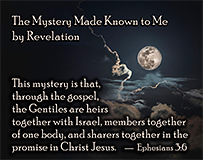
Ephesians 3:1–13 . . .
“God’s Extraordinary Plan to Overcome a Divide”
As highlighted in my previous commentary titled “Man’s Guilt, God’s Grace,” Apostle Paul told us that Gentile Christians were no longer excluded but have become new family members with all of God’s people. Paul began a transition in 2:13 to show that the Jew and non-Jew separation on the basis of circumcision had ended, thanks to Jesus, and through him all people can believe and become part of God’s united family: the church.
We’ll now see how chapter 3 speaks about the mystery of Christ revealed in vv. 1–13, which introduces the calling that’s been entrusted to Apostle Paul and its relationship to his ministry.
Herein, Paul mentions himself by name as a prisoner in behalf of the Gentiles (v. 1), assuming that his readers know that he’s been called by God to serve them. The gospel was revealed to him mysteriously (v. 3) through the gospel: Gentiles had become fellow family members of the church (v. 6), thanks to God’s grace. Although he was the least likely apostle to unveil the gospel account and share Christ with the Gentiles, God called him to do that. Accepting his calling, he endeavored to enlighten everyone about God’s grace and eternal plan (v. 11). Paul added, “We may approach God with freedom and confidence” through our faith in Jesus (v. 12). The apostle then appealed to his readers to not be discouraged by his imprisonment.
Paul: The Prisoner of Christ for the Gentiles (3:1)
This chapter is directly related to chapter 2, since Paul begins with, “For this reason…” His imprisonment ought to have confirmed his apostleship. But his opponents didn’t see it that way. So he points out to the Ephesians that his chains served to prove, albeit declare, his calling. In v. 1 Paul confirms that he’d been imprisoned because he’d preached the gospel to the Gentiles.
Although we aren’t told the extent to which he was encumbered by prison chains, Paul was aware of his prisoner status — not only a prisoner for Christ but also for his Gentile readers. His final words on the subject of his imprisonment (v. 13) reveal why he senses the need to mention this personal circumstance. He didn’t want the Ephesian believers to become discouraged by his imprisonment; instead, he wanted to encourage them by reassuring them that his suffering would be for their glory.
God’s Marvelous Plan for the Gentiles
3 1For this reason I, Paul, the prisoner of Christ Jesus for the sake of you Gentiles… (Ephesians 3:1 NIV).
Clearly, letter-writer Paul was a prisoner of Jesus for the well-being of Gentile believers. Later in this passage, his “prisoner of Christ Jesus” reference will become clear when he speaks of God’s new commission or plan given to him with grace. He regards this ministry as a “mystery made known to [him] by revelation.” His arrest, upcoming trial, and chains were the result of his being faithful to this missionary calling to preach the gospel to the Gentiles. There was no doubt in Paul’s mind what God had called him to do.
God’s Grace — The Mystery of Christ (3:2–6)
By starting v. 2 with “Surely you have heard,” Paul clearly knew his specific calling to the Gentile world was well known among Gentile Christians. The Ephesian believers should have accepted by now that God had entrusted the gospel of God’s grace to Paul in behalf of the Gentiles. That calling, related to “the administration of God’s grace that was given to me for you,” dealt with what God planned for his church. [The word “administration” refers here to a divine order or command.] Paul had either been gifted to preach the gospel among Gentiles or ordered by God to follow his gracious, divine plan to convert the Gentiles.
2Surely you have heard about the administration of God’s grace that was given to me for you, 3that is, the mystery made known to me by revelation, as I have already written briefly. 4In reading this, then, you will be able to understand my insight into the mystery of Christ, 5which was not made known to people in other generations as it has now been revealed by the Spirit to God’s holy apostles and prophets. 6This mystery is that through the gospel the Gentiles are heirs together with Israel, members together of one body, and sharers together in the promise in Christ Jesus (Ephesians 3:2–6 NIV).
The mystery Paul wanted the Ephesian believers to know that he wasn’t making things up. He was saying, I take it that you’re familiar with the part I was given in God’s plan for including everybody. There’s no doubt that I got the true revelation or inside story on this from God himself, as I recently wrote you in brief (v. 3).
Paul describes the gospel of grace as a “mystery” revealed to him. It’s a mystery in that the gospel message, once hidden, was now revealed. God amazingly used Paul — a Hebrew, a Pharisee, a persecutor of the church — to become the primary administrator of this mystery of how the gospel would effectively bring Jew together with Gentile as one new church body. Here in Paul’s epistle to the Ephesians, he speaks of the mystery that centers on Jesus Christ and his church. In fact, Paul calls this is “the mystery of Christ.”
In chapter 1, Paul indicated that the mystery was Father God’s intention to sum up all things in Christ (1:8b–10). Here, at the start of chapter 3, we’re to explore that mystery and realize how it effects the life of Apostle Paul and the Jewish and non-Jewish believers in Christ. From this, we’ll also gain insight into the way in which this mystery relates to our own lives.
To understand the content of vv. 3–6’s mystery, look back to the previous passage of this epistle. In 2:12, the Gentiles (literally everyone not an Israelite) “were separate from Christ.” But then in 2:18, we see the Gentiles’ intended destiny: to “have access to the Father by one Spirit.” This is God’s plan revealed to Paul who thankfully accepted this calling. Old Testament saints — “people in other generations” (v.5) — understood God’s mercy but lacked insight into the extent of his grace in and through the person and work of Christ. Only the apostles and New Testament prophets possessed this insight.
In 3:6, Paul discloses Christ’s mystery: Gentiles are to become fellow-heirs, being of the same body as the Israelite believers, partaking of Christ’s promise made in the gospel. The secret truth, now revealed, concerns God’s free and gracious acceptance of all who trust Christ. For our apostle, the implication is worth giving prominence to: Jew and Gentile together share equally the promise of salvation (Romans 8:17).
Becoming a Gospel Servant (3:7–9)
God appointed Paul to administer this mystery to the Gentiles. About this divine calling, Paul says it was a “gift of God’s grace” (v. 7), albeit an act of kindness. While Paul was unworthy, God entrusted him to administer, present, and promote the gospel mystery, amounting to “the boundless riches of Christ” (v. 8). And, although the mystery had been hidden for generations, God intended that everyone would inevitably understand his action-plan (v. 9).
7I became a servant of this gospel by the gift of God’s grace given me through the working of his power. 8Although I am less than the least of all the Lord’s people, this grace was given me: to preach to the Gentiles the boundless riches of Christ, 9and to make plain to everyone the administration of this mystery, which for ages past was kept hidden in God, who created all things (Ephesians 3:7–9 NIV).
Paul, having proclaimed the gospel to be the instrument he’ll use to convey riches to the Gentiles, now adds that he “became a servant of this gospel” and, because of this, applies to himself the general statements that had been made. However, to prevent crediting himself unsuitably, he affirms that it’s “the gift of God’s grace given me” and that his gift documents his divine power. It’s as if he said, This is my life work: helping people understand and respond to the gospel message. It came as a sheer gift to me, a real surprise, with God handling all the details.
The apostle was thankful and humble to have received Father God’s calling to servanthood. We see in v. 8 how he marveled at the grace that God had given him, by which he’d been called “to preach to the Gentiles the boundless riches of Christ,” thereby transforming the mystery of Christ into reality. The ancient Greek word kerusso, translated “preach,” literally means “to announce good news.” Paul’s preaching simply announced the good news of what God has done in Jesus. What he preached to the Gentiles was “the boundless riches of Christ.” In reality, such a mystery amounted to great riches for the Gentiles who became permitted to come before God with a stature they could only dream of previously.
in v. 9, Paul tells his readers that he was called to make this gospel account known to everyone so they could appreciate and take part in the fellowship of this mystery, which was hidden and unknowable to the Gentiles until God revealed it to them. His reference to “the administration of this mystery” likely refers to not only mindful facts but actual ways to live. That is, living life to the full, realizing that they’ve all become united in Jesus with other believers, without the previous Jew-from-Gentile separation. This great truth, previously hidden, was revealed at the completion of Jesus’ work on the cross.
God’s Manifold Wisdom (3:10–13)
God had a specific purpose and plan to use the newly united church.
10His intent was that now, through the church, the manifold wisdom of God should be made known to the rulers and authorities in the heavenly realms, 11according to his eternal purpose that he accomplished in Christ Jesus our Lord. 12In him and through faith in him we may approach God with freedom and confidence. 13I ask you, therefore, not to be discouraged because of my sufferings for you, which are your glory (Ephesians 3:10–13 NIV).
What does the phrase “the manifold wisdom of God” in v. 10 mean? According to Got Questions Ministries, “The word translated ‘manifold’ in v.10 means ‘many and varied; having many features and forms; wrought in various colors; diversified, intricate, complex, many-sided.’ God’s wisdom in His extraordinary plan of salvation, as seen in the new and mysterious creation of the church, is a multi-faceted, many-colored, culturally diverse, rich, and beautiful community of believers. There’s no other human co-op like it in the world.
“According to Bible commentators, ‘the manifold wisdom of God’ is a poetic, artistic expression suggesting the intricate nature of an embroidered pattern, as in Joseph’s ‘tunic of many colors’ (Genesis 37:3, NKJV). Each member of Christ’s body manifests a different aspect of God’s image (Gen. 1:26–27; Eph. 4:24). Together, believers form a perfect blend of harmony and diversity. The many features, forms, and colors of fellowship in the church reflect ‘the manifold wisdom of God.’”[1] We believers can picture God’s manifold wisdom as a global, body-of-Christ-shaped tapestry. Our individual lives are the various colored threads woven together in unity of purpose to display God’s manifold wisdom through his church. We do this by presenting to everyone in the world the good news of salvation in Jesus Christ.
Verse 11 explains God’s sovereign intent to achieve reconciliation through Christ. Paul goes on to explain in v. 12 the substance of “the manifold wisdom.” God’s purposes are accomplished through faithfulness in Christ, which believers acquire in union with him. It’s the fulfillment of his divine plan in Christ for a united church. God’s sovereignty over all creation should give every Christian confidence through their faith in God.
Paul closes this passage by advising us that Ephesian believers’ confidence should increase, despite the afflictions they may experience, including the news of Paul’s sufferings; even they are part of God’s plan, so there’s no reason to be discouraged. Rather, his sufferings were for the Ephesians’ glory. His readers should be glad because his imprisonment is evidence of his fulfilled calling to serve the Gentiles. God is the Master administrator of his plan; nothing on earth or in heaven can be at odds with the Father’s "eternal purpose" (v. 11).
Apostle Paul’s Personality and Passion on His Missionary Journey in Ephesus
† Watch this video highlighting Paul in Ephesus — created by Our Daily Bread Ministries.
Intro Video: “Ephesians”
† Here’s a superb overview video of this epistle, created by BibleProject.
- Q. 1 Realizing the importance of Paul’s “calling,” what has God called you to do for him?
- Q. 2 What is “the manifold wisdom of God” that Paul references amid v. 10?


